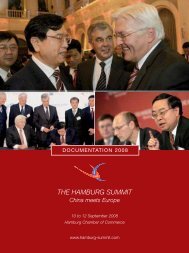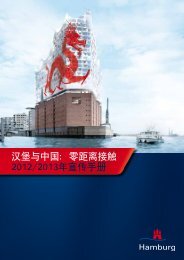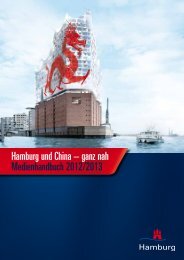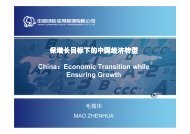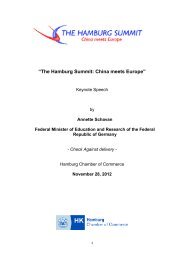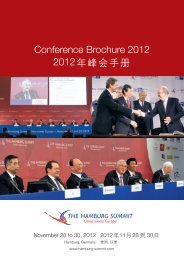Documentation Brochure - Hamburg Summit
Documentation Brochure - Hamburg Summit
Documentation Brochure - Hamburg Summit
- No tags were found...
You also want an ePaper? Increase the reach of your titles
YUMPU automatically turns print PDFs into web optimized ePapers that Google loves.
Banking and Finance in China<br />
Heinz Dollberg, Allianz Versicherungs-AG Ulrich W. Ellerbeck, HSH Nordbank AG Margot Schüller, GIGA - Institute of Asian Affairs Jin Yun, Shanghai Pudong Development Bank<br />
The financial sector is the heart of the<br />
economy,” said Jin Yun, Chairman of<br />
the Shanghai Pudong Development<br />
Bank. Because growth was unlikely to<br />
lose momentum in the years ahead the<br />
sector was sure to play a much larger<br />
role in the future than it does today. Jin<br />
described three conditions that had to<br />
be fulfilled to ensure that it does. “We<br />
must open the door, we must broaden<br />
the open areas and, compared with<br />
years ago, our steps must be bigger.”<br />
In principle, he said, there can be no<br />
doubt on these points, “but we feel that<br />
finance is very sensitive.” The opening<br />
of the financial sector must not proceed<br />
at a faster pace than the development<br />
of the economy. Otherwise restrictions<br />
would be inevitable, with unforeseeable<br />
consequences for the economy. “If you<br />
look at international financial institutions,”<br />
Jin said, “they took a long time to<br />
develop.”<br />
The greatest uncertainty Chinese<br />
banks face continues to be non-performing<br />
loans. Rainer Schäfer, head of<br />
country risk and emerging market<br />
research at Dresdner Bank, said: “The<br />
government has done a lot to recapitalise<br />
Chinese banks, bring down<br />
the ratio and improve controlling, but<br />
there can be no doubt that a big black<br />
hole still exists.” Heinz Dollberg, head of<br />
the Asia Pacific division at Allianz<br />
Versicherungs-AG agreed: “The capital<br />
market is the bottleneck.” And Ulrich<br />
W. Ellerbeck, Member of the Management<br />
Board of HSH Nordbank in<br />
<strong>Hamburg</strong>, also promised that “many<br />
years will elapse before we see a really<br />
free market in China.”<br />
So why is the HSH Bank already<br />
committed in the country if Ellerbeck is<br />
convinced that in view of the size of the<br />
market all foreign banks are just niche<br />
players “We have to follow our<br />
customers and we have to protect<br />
them,” he said. Given the size of the<br />
market, he added, being represented in<br />
it would seem to be a must. “Investing<br />
in the Chinese market is investing in the<br />
future,” Ellerbeck and his colleagues<br />
agreed calling unanimously for further<br />
liberalisation of the market. Competition<br />
is still rudimentary, as Dollberg<br />
made clear by means of a small example.<br />
In all of China a total of 36 insurance<br />
companies are now in business.<br />
And how many compete in the German<br />
market “More than 1.500,” Dollberg<br />
said. Jin Yun added: “As Chinese banks<br />
we are already feeling the pressure of<br />
competition. We have to learn how to<br />
compete with you, we still have a way<br />
to go before we reach international<br />
standard.” To do so, many innovationsremain<br />
to be implemented. Management<br />
skills must be improved, Chinese<br />
banks must learn to handle risks and<br />
they must, above all, look after their<br />
customers much more effectively.<br />
“The key of all keys,” Jin Yun was<br />
firmly convinced, “is to train talents,<br />
and the key to training talents is to<br />
change mentality.”



